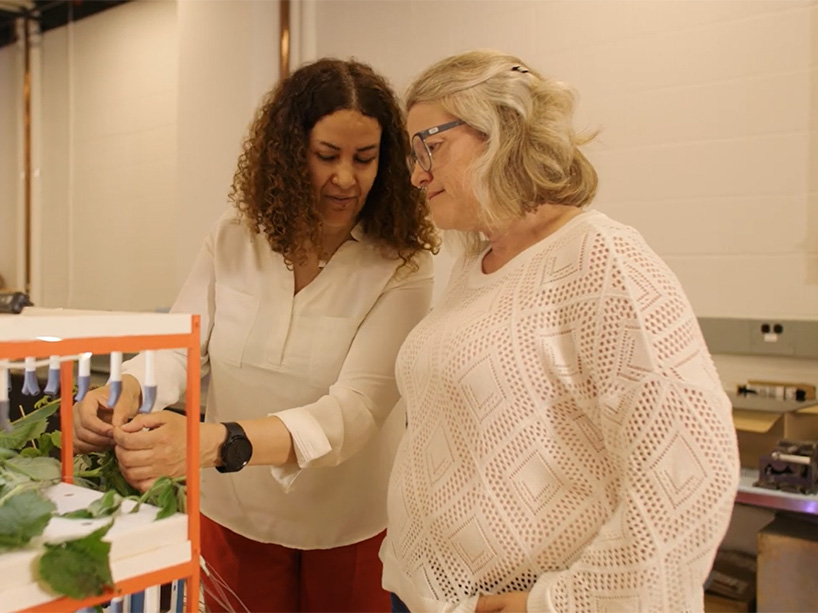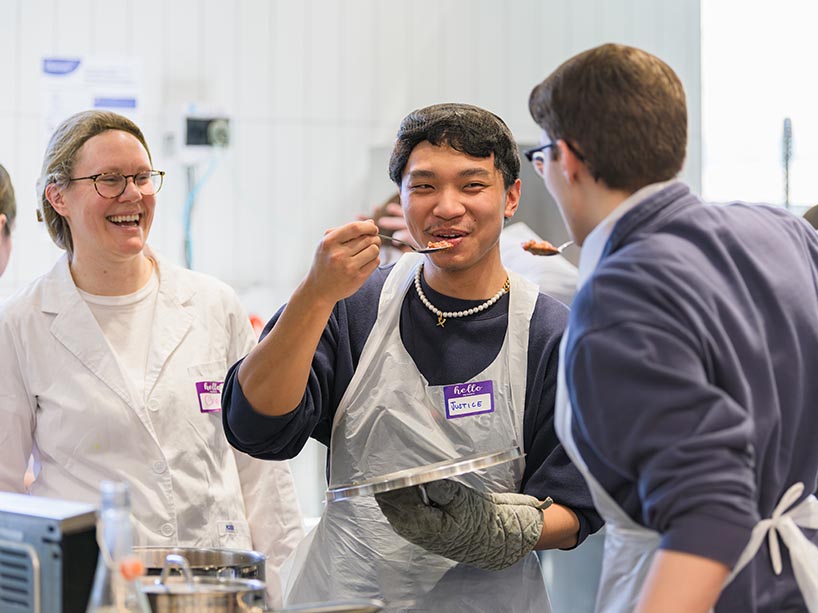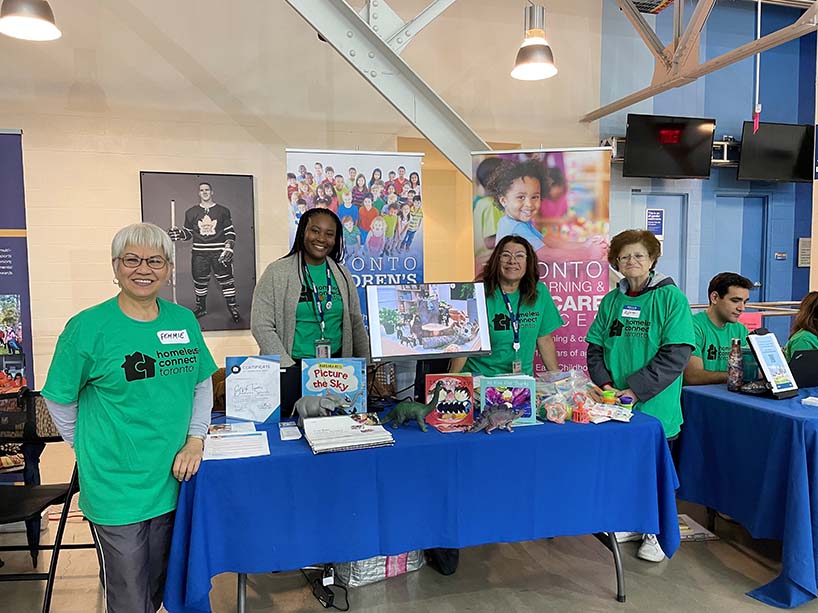SDG 3: Good Health and Well-Being


SDG 3: Good Health and Well-Being
Through our academic programs, research and community partnerships, Toronto Metropolitan University is committed to advancing health and well-being on campus, in our local community, and around the world. We are dedicated to fostering a holistic approach to health that addresses physical, mental and social well-being.
14.5% of TMU graduates are from health-related programs (2023)
16 accredited residency programs at TMU’s new School of Medicine
Our goals in action

TMU offers a diverse range of academic programs across various credential levels and disciplines that focus on health and well-being. Highlighted by our new School of Medicine, these programs prepare students to tackle the complex health challenges of today and tomorrow.
- TMU’s new School of Medicine, opening in 2025, will focus on primary care for diverse, underserved populations. The school aims to produce compassionate, future-ready clinicians through community-engaged education, scholarship, and service.
- The Daphne Cockwell School of Nursing offers various nursing programs, including a Collaborative Nursing Degree (BScN), Post-Diploma Degree Completion (BScN), Master of Nursing (MN) and Nurse Practitioner certificates. It also offers an interdisciplinary Urban Health PhD program focused on leadership in healthcare.
- TMU offers one of only two Bachelor of Health Sciences in Midwifery programs in Ontario. There is also an accelerated post-baccalaureate program for those with a health-related degree and labor/delivery experience, with placements available in Northern Ontario, Francophone, or Indigenous communities.
- TMU also offers various programs related to health management and administration, including BHA Health Administration, BASc in Public Health, BASc Occupational Health and Safety, and MSc Occupational and Public Health.
- For adult learners, the Chang School of Continuing Education offers various certificate programs in health and well-being topics, and the Ted Rogers School of Management offers the Foundations of Health Administration and Community Care Mini-Masters to newcomer women.
As a hub of health research, TMU is advancing both the clinical and social aspects of health and well-being. Our work is conducted in partnership with industry and healthcare organizations, contributing to innovative solutions and improved health outcomes.
- The Canada Excellence Research Chair (CERC) in Health Equity and Community Wellbeing program, led by professor Karen Soldatic, focuses on community partnerships to improve health outcomes for all, challenging expert-driven approaches and promoting a preventative, community-engaged model. It uniquely applies a critical disability lens to address health disparities and integrate community knowledge into healthcare systems.
- TMU nursing professor Elaine Santa Mina led a team of experts to develop the Canadian Federation of Mental Health Nurses’ most recent Standards of Practice – a national resource for mental health nurses. Updated about every five years, the Standards of Practice guide mental health nurses as they care for patients with diverse mental health needs. The Faculty of Community Services professor led a cross-country team of psychiatric-mental health nursing educators, clinicians, researchers and TMU Master of Nursing students in the revision of the standards.
- Chemical engineering professor Dae Kun (Rilla) Hwang and his team developed a microfluidics device that reduces the wait time for the prostate-specific antigens (PSA) biomarker test for prostate cancer to just 15 minutes. The device uses a small blood sample and can be operated by non-specialized technicians. Future developments aim to reduce wait time further and expand detection capabilities.
- Nursing professor Sue Bookey-Bassett and engineering professor Patrick Neumann developed workload simulation models to help healthcare decision makers understand and improve care delivery. Their models simulate healthcare units to explore real-life scenarios, helping to optimize workloads and care quality in various settings.

TMU prioritizes the health and well-being of its campus community by implementing initiatives that promote wellness. Our campus environment supports physical and mental health, ensuring that all members have access to the resources they need to thrive.
- The Community Wellbeing (CW) department at TMU takes a systems-level approach to address issues impacting wellbeing across the campus community, including both students and staff at the university. CW’s goal is to proactively identify and address issues with the overall aim of reducing strain on downstream services and increasing wellbeing across the TMU community.
- The Environmental Health and Safety (EHS) team at TMU leads, guides and supports environmental health and safety excellence and innovation to enable us to achieve our vision and priorities. The team partners with all academic and administrative departments and provides technical expertise, education and leadership to help build capacity and innovative solutions to cultivate safe, healthy and environmentally responsible operations, teaching and research.
- TMU offers an Indigenous Wellbeing and Cultural Practice Leave. Eligible Indigenous staff from Canada can take up to five paid days per year to support healing and wellbeing, including cultivating cultural interests and practices. The leave is a direct response to recommendations from the TRC Community Consultation Summary Report and Standing Strong Task Force Report, as well as the broader historical context in which Indigenous People have systematically been denied the right to practice their cultural and spiritual traditions.

TMU is dedicated to supporting students’ physical and mental health through a variety of services and wellness initiatives. We offer opportunities for fitness, stress relief and overall wellbeing, helping students to balance their academic and personal lives.
- The Medical Centre on campus offers health services to TMU students, staff and faculty, including physicals, mental health assessments, assessments for common medical problems, immunizations, and medical certificates. The Medical Centre is a non-profit unit of Student Wellbeing that aims to promote a healthy environment for work and study.
- TMU offers counselling services for students, including those experiencing mental health crises and those seeking other forms of support.
- At our two fitness centers, the Recreation & Athletics Centre and the Mattamy Athletic Centre, as well as through various initiatives on campus, TMU strives to provide spaces where our community members can engage in a wide range of physical activities to stay fit. TMU’s Recreation & Active Wellbeing web page can help you find an activity or program that’s right for you.
TMU actively works to be a good neighbour by supporting individuals struggling within our community. We share knowledge beyond our borders, collaborating with local and global partners to promote health and well-being for all.
- TMU has established partnerships with the City of Toronto, Toronto Public Health, Toronto Police Service, and local businesses and nonprofits to support the wellbeing and safety of our community. This includes initiatives to respond to medical emergencies, offer harm reduction support, de-escalate threatening situations and bring appropriate services to street-involved individuals who may be experiencing addictions, challenges with mental health and who are unhoused.
- TMU nursing professors Margareth Zanchetta and Kateryna Metersky collaborated with Academics Without Borders, the University of Brasilia and the Federal University of Pernambuco to launch a capacity-building project in Brazil to provide healthcare for immigrants, refugees and stateless individuals. The partnership included the design of a professional development course for use by those who deliver services in the world’s largest government-run public health care system, the Brazilian Unified Health System.
- The programming of Finding Our Power Together, a national Indigenous-led nonprofit aiming to empower youth, is informed by the research of TMU professor Nicole Ineese-Nash. She founded the nonprofit to offer culturally based, in-person and virtual therapeutic programs and services across Canada. Finding Our Power Together’s programming ranges from one-on-one mentorship, to group youth events, to an online psychoeducation program.




